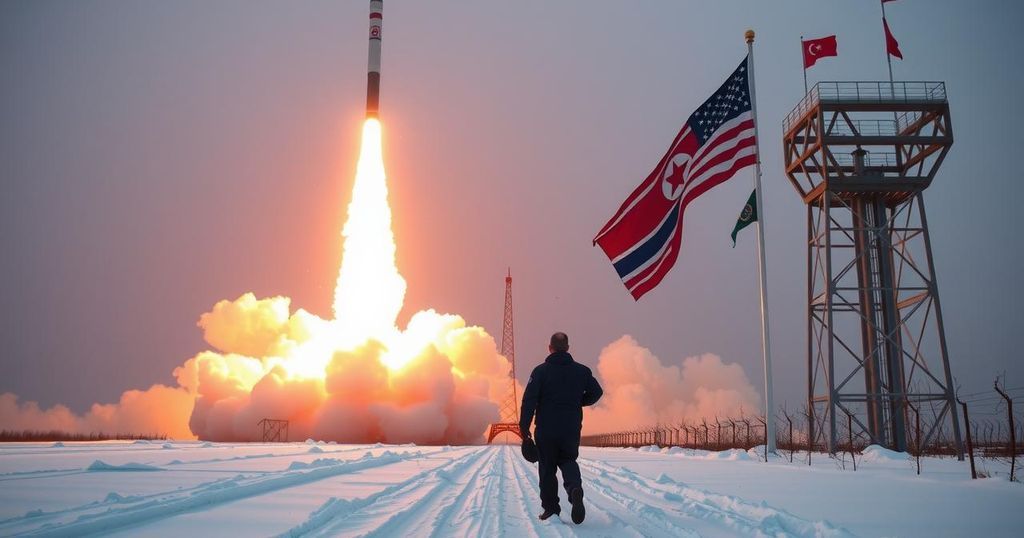North Korea fired a missile coinciding with Secretary of State Antony Blinken’s visit to South Korea, where he warned of increased cooperation with Russia on advanced military technology. Amidst political tensions surrounding President Yoon Suk Yeol, Blinken reinforced the importance of trilateral cooperation in response to North Korea’s actions and expressed concern about the implications of Russia’s support for the regime. The situation calls for renewed focus on diplomatic efforts to address regional security concerns.
On Monday, North Korea launched a missile as U.S. Secretary of State Antony Blinken was in South Korea, where he expressed concerns regarding the burgeoning cooperation between Pyongyang and Moscow concerning advanced space technologies. This missile test coincided with political unrest in South Korea, where President Yoon Suk Yeol, embroiled in controversy over a failed martial law attempt, remained confined to his residence following impeachment proceedings.
During his discussions in Seoul, which aimed to ensure continued cooperation between South Korea and Japan, Blinken condemned the missile launch, which traveled approximately 1,100 kilometers into the sea. He highlighted the importance of collaborative defense efforts with South Korea, emphasizing the increased intelligence-sharing and joint military exercises undertaken amidst these tensions.
Blinken specifically referenced North Korea’s growing dependence on Russian military support amidst its involvement in Ukraine, raising alarms that Russia may provide Pyongyang with crucial space and satellite technologies. The U.S. and allied forces have observed North Korea’s prior military contributions to the conflict in Ukraine, which reportedly led to significant casualties among its troops.
In a parallel development, Prime Minister Shigeru Ishiba of Japan raised concerns over the advancements in North Korean technology, reflecting growing regional security worries. Amidst discussions regarding North Korea’s improved capabilities, historical context plays a crucial role, particularly the diplomatic outreach attempted by former President Donald Trump, which was characterized by direct engagement. In contrast, the current administration under President Joe Biden advocates for a more structured approach to nuclear disarmament talks without resorting to personal diplomacy.
As Blinken navigated this politically charged atmosphere, he also addressed the ongoing crisis surrounding President Yoon. Notably, he reaffirmed allegiance to democratic values while avoiding direct commentary on the political turmoil within South Korea. The ongoing collaboration with the Biden administration had previously positioned President Yoon favorably due to his initiatives in strengthening relations with Japan.
In his discussions with Cho Tae-yul, South Korea’s Foreign Minister, Blinken underscored the significance of strong U.S.-Korea alliances and conveyed confidence in South Korea’s institutional integrity. This situation exemplifies the ongoing complexities and challenges facing U.S. foreign policy in East Asia, heightening awareness of North Korea’s advancing military capabilities and the implications of Sino-Russian partnerships.
The geopolitical landscape surrounding North Korea continues to evolve, particularly in light of its increasing interactions with Russia. In recent months, the focus has shifted to the implications of this partnership, specifically regarding advancements in military technology and support following North Korea’s involvement in the Ukrainian conflict. Secretary of State Antony Blinken’s visit to South Korea aimed to shore up U.S. alliances and discourage North Korean aggressiveness, particularly as domestic political tensions in South Korea complicate diplomatic engagements in the region. Historical precedents, including past U.S. administrations’ strategies toward North Korea, provide important context for understanding the current dynamics and underlying tensions in U.S.-North Korea relations.
The missile launch by North Korea during Secretary Blinken’s visit underscores the escalating tensions on the Korean Peninsula and the potential ramifications of its cooperation with Russia. As Blinken emphasized the need for multilateral collaboration among U.S. allies, the actions taken by North Korea highlight the urgency of addressing security threats in the region. The geopolitical climate continues to be shaped by both North Korean advancements in military capabilities and the political machinations within South Korea, necessitating a comprehensive, cooperative approach towards stability in East Asia.
Original Source: www.dawn.com






